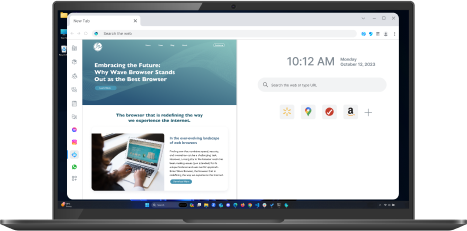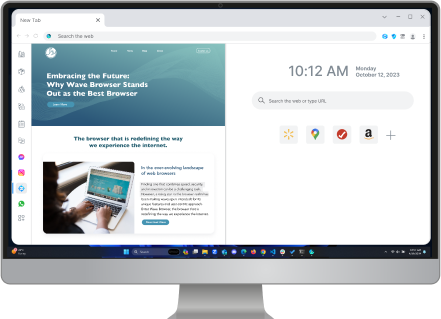Best Browser for Performance: Which One Wins in 2025?
Table of Contents

Web browsers are the entrance to the online world. They are very important in defining your internet connection and browsing experience. Today, speed, security, and ease of use on different devices matter a lot. Choosing the best browser for performance is more important than ever. Each browser offers its own strengths. Some focus on productivity, while others focus on privacy.
This guide looks at the best browsers for performance in 2025. It will help you pick the one that improves your web journey without losing efficiency or safety.
Best Browser for Performance in 2025
When it comes to choosing a good web browser, performance remains the top priority. In 2025, Google Chrome continues to lead the pack with its speed, compatibility across countless websites, and useful features. Microsoft Edge also delivers impressive speed—especially on Windows devices—making it a reliable alternative.
Different browsers cater to different user needs. Apple Safari is the ideal choice for Mac and iOS users, thanks to its seamless system integration. Opera browser stands out for its built-in VPN and strong integration with social media platforms. Firefox is a favorite for privacy-conscious users, offering robust security features and tracking protection. Power users who enjoy deep customization might opt for Vivaldi, though it trades off some speed for flexibility.
Wave Browser has also become a better option in the browser space. Designed for simplicity and efficiency, it delivers a lightweight, fast experience with a clean interface that minimizes distractions.
With so many choices—each tailored to a different type of user—it’s easier than ever to find the best browser for performance that fits your digital lifestyle.
1. Wave Browser: Streamlined for productivity

Wave Browser stands out among smaller browsers with its minimalist design, built specifically for users who value productivity. With minimal bloatware, it remains fast, lightweight, and user-friendly—making multitasking feel effortless.
Its intuitive tab management and subtle integrations with tools like calendars and task managers make it an excellent choice for professionals. Whether you're planning your day or switching between open tabs, Wave helps you stay organized without distractions.
Features like task prioritization, quick-loading web pages, and custom keyboard shortcuts allow users to spend their online time more efficiently. You can easily manage bookmarks, group browser tabs by project or topic, and build a workflow that fits your routine.
While it may not match the raw speed of industry giants like Chrome, Wave Browser delivers responsive performance and purpose-driven features. Whether you're building a presentation, researching online, or organizing personal goals, Wave offers a clean, efficient browsing experience that supports your focus and productivity.
2. Google Chrome: Speed and Integration

Google Chrome remains the top choice for many users thanks to its exceptional speed and tight integration with Google’s services. Whether you're streaming videos, using web apps, or syncing bookmarks across devices, Chrome delivers a smooth and responsive experience—especially on Windows, where it outpaces most competitors.
Its clean, intuitive interface makes browsing easy. The address bar doubles as a search tool, saving time and streamlining navigation. Chrome’s tab group management and seamless connections to tools like Gmail, Google Docs, and Google Drive make it ideal for multitasking and work-related tasks without slowdowns.
Built on the Chromium engine, Chrome supports a vast ecosystem of third-party extensions, giving users the freedom to customize their browsing experience to match their needs and preferences.
However, there are concerns when it comes to data privacy. Chrome is known to collect significant user data, which may not sit well with those who prioritize anonymity and security. Even so, for users who value speed, functionality, and deep integration, Chrome continues to be the leading choice across platforms.
3. Mozilla Firefox: Privacy and Customization

Mozilla Firefox is built for users who value privacy. It blocks third-party trackers, encrypts browser requests with DNS-over-HTTPS, and stores passwords locally to reduce hacking risks. Its Private Browsing Mode (similar to Incognito Mode) blocks trackers and clears browsing history after each session for added security.
Firefox also offers strong customization with themes, menu layouts, and powerful add-ons. Since its 2021 redesign, it continues to deliver a user-focused, secure browsing experience.
4. Apple Safari: Optimized for Mac Users

Apple Safari is the default browser on macOS, and it’s tailored specifically for Apple devices, offering unmatched speed and efficiency. Regularly competing with Google Chrome for the title of fastest web browser, Safari stands out with its lightweight design that uses minimal memory—delivering an exceptionally smooth browsing experience for Mac users.
Power users appreciate features like tab previews, one-click translations, and intelligent tab management, all designed to enhance productivity without compromising simplicity. Its tight integration with macOS allows for faster load times and more efficient battery usage compared to third-party browsers.
Safari also places a major focus on privacy. The built-in Privacy Report Panel gives users clear insight into how often websites attempt to track them, while advanced tracking prevention blocks cookies and trackers by default. This proactive approach helps minimize annoying ads and protect personal data—offering a significant advantage over browsers like Chrome, which face criticism for extensive data collection.
The main limitation is that Safari is exclusive to Apple devices, meaning Windows and Android users have to look elsewhere. However, for those fully immersed in the Apple ecosystem, Safari offers hardware-optimized performance, robust security, and a clean, user-centric design that’s hard to beat.
5. Opera: Built-in VPN and Social Media Tools

Opera continues to stand out in 2025 thanks to its unique combination of features, including a built-in VPN service and streamlined social media integration. Its sidebar provides quick-access shortcuts to popular platforms like Instagram, WhatsApp, and Facebook Messenger, making it a favorite for multitaskers who need everything within easy reach.
Opera’s VPN comes in two options: a free VPN for casual use and VPN Pro for more robust, cross-device protection—giving users flexibility based on their privacy needs.
While Opera may not always match Chrome’s speed in browser benchmark tests, it offers significant advantages in online security and anonymous browsing. Its Battery Saver Mode is a bonus for mobile and laptop users, pausing unnecessary animations and background tasks to extend battery life.
Opera truly shines for social media enthusiasts. With features like pinned chats, direct video calls, and messenger integrations, staying connected virtually becomes faster and more intuitive. Although it may occasionally encounter compatibility issues with certain websites, its advanced tools and privacy features clearly set it apart from other browsers.
For users who value a balance between privacy, productivity, and seamless social media access, Opera remains a practical and enjoyable choice.
Detailed Analysis of Browser Performance
Analyzing how web browsers perform includes looking at their speed, privacy protections, and how easy they are to use. In 2025, Google Chrome was the fastest browser on many platforms. Apple Safari was the quickest on macOS, with Chrome not far behind. Users who care about privacy might choose Firefox, while those who like to customize their experience often prefer Vivaldi.
Each browser fits different browsing needs, whether for speed or special features. With this information, users can choose the best browser for performance based on their needs.
Speed Benchmarks: How They Stack Up
Speed tests conducted in 2025 revealed Google Chrome as the leader in Speedometer 2.0 benchmarks among the major browsers, followed closely by Microsoft Edge. On macOS, Safari and Chrome battled for first place, both showcasing superior speeds in page loading and application responsiveness.
While high-speed benchmarks are enticing, factors like memory consumption and compatibility also play a major role in selecting the best browser. For users who prioritize raw speed, Chrome and Microsoft Edge are clear-cut options.
However, for those who value a lightweight, efficient browsing experience with smooth multitasking with split view, Wave Browser offers an good alternative—balancing performance with simplicity.
Privacy Features: Safeguarding Your Online Activity
Today’s browsers are focusing more on protecting user privacy. Wave Browser offers built-in tools like a VPN and ad blocker to help users browse securely and without interruptions. Brave blocks trackers and ads by default, while Microsoft Edge provides customizable tracking prevention. Although Google Chrome is fast, it still faces concerns over data collection.
As online tracking grows more advanced, choosing a browser with strong privacy features is essential for staying safe.
User Experience: Interface and Usability
A user-friendly browser helps users shift easily between tabs and web applications. Chrome’s easy tab grouping helps people keep their work and fun separate. Safari’s one-click translations make browsing easier. Opera is great for those who love social media, thanks to its pinned chat feature. Vivaldi has a customizable toolbar, making it ideal for those who want to personalize their experience.
Key user-friendly features are:
- Integrated search bars: Found in Chrome and Firefox.
- Pinned tabs: Popular in Opera and Edge for fast access to favorite sites.
- Theme customization: Offered by Vivaldi for users wanting creative control.
Tech Innovations: Future-Proofing Browsers
The future of web browsing is all about new ideas that match what users want. Artificial Intelligence (AI) is playing a bigger part in making predictive browsing better, automating jobs, and improving search results. For example, Google Chrome’s new machine-learning tools promise to make processing user data more efficient.
Tech ecosystems like Apple use browser features that work well with their devices. Meanwhile, Opera is adding crypto wallet integration to keep up with modern finance and blockchain. Microsoft Edge is bringing in advanced vertical tab layouts to help users multitask.
Browser Ecosystems: Integration with Devices and Services
Integration is very important when picking a browser. Chrome leads the way by syncing smoothly between Android, iOS, and desktop devices. On the other hand, Safari makes it easy to move around in Apple’s ecosystem. This helps with quick changes between Mac, iPhone, and iPad. Mozilla Firefox also allows syncing across different platforms while ensuring strong security.
Edge offers Collections, which help you organize research projects on different devices. These connected services make modern browsing easier. They support smooth use and good productivity across different platforms. No matter if you want easy integration or specific services, ecosystems are important for user satisfaction.
Syncing Across Devices: Seamless Connectivity
Browsers in 2025 are focusing more and more on seamless connectivity. Users can easily sync their data across desktops, tablets, and smartphones. Google Chrome is leading the way with device syncing. It links Google accounts so users can access bookmarks, history, and saved passwords with ease. Safari connects with Apple’s iCloud, which helps users bridge MacBooks, iPhones, and other Apple devices.
Firefox is focused on secure connectivity. It offers encrypted syncing options that protect user data on devices that are shared. Opera provides specific social media shortcuts that sync across different platforms. This allows for better communication tools everywhere.
This ability to sync across devices makes work easier for users who use more than one device at a time. Whether they are finishing tasks on mobile or going back to saved tabs on a desktop, these syncing features are key to a smooth online experience.
Extension and Add-ons: Expanding Functionality
Extensions and add-ons change browsers into customized tools for different needs. The Chrome Web Store has the biggest collection of extensions for browsing. Edge can also use Chrome extensions. Firefox is known for its tools that focus on privacy, like blocking trackers. Vivaldi offers extensions that allow users to use gestures for more creative control.
For specific users, Opera includes a built-in VPN and messaging extensions, offering helpful features without relying solely on third-party tools. Similarly, Wave Browser provides built-in tools in its sidebar, giving users quick access to essential features like ad blockers, VPN settings, and productivity shortcuts. Meanwhile, Safari focuses on simple, secure extensions, such as apps for managing passwords.
These upgrades support a variety of tasks, whether it's serious research or casual browsing. A strong set of built-in features and extensions allows users to customize their browser easily and work the way they prefer—without extra hassle.
Special Features That Set Each Browser Apart
In 2025, every browser offers special features for different needs. Safari is best known for its smooth Privacy Reports. It is perfect for Mac users who care about speed and security. Firefox has earned the title of privacy champion thanks to tools like DNS-encryption and cryptominer blockers.
Opera stands out by providing social shortcuts and a cost-effective VPN. Chrome is often considered the best browser for performance, thanks to its speed, stability, and seamless handling of demanding tasks. Its extensive extension library also makes it highly versatile and reliable for both everyday use and advanced workflows. Vivaldi gives users the ability to customize their experience with theme designs and gesture commands.
These features show how browsers cater to specific tasks while also focusing on overall performance. By choosing the best browser for performance, users can have a more effective and meaningful experience on the web, whether they need privacy tools or productivity boosts.
Surf with Ease, Speed, and Security!

Download Wave Browser for a seamless online experience like never before. Try it now!


























